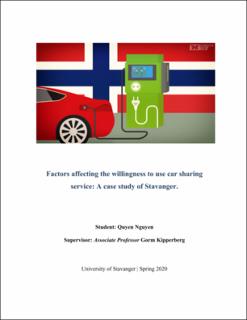Factors affecting the willingness to use car sharing service: A case study of Stavanger.
Master thesis
Permanent lenke
https://hdl.handle.net/11250/2690135Utgivelsesdato
2020-07-15Metadata
Vis full innførselSamlinger
- Studentoppgaver (Business) [1035]
Sammendrag
Car sharing, an emerging phenomenal innovation, has received increasing attention from both academia and business in recent decades. While car sharing is considered a potential lever for the shift towards sustainable mobility, it often encounters barriers stemming from local contexts, and the lack of consumer willingness to participate in the scheme. In Stavanger, car sharing was first adopted more than ten years ago, and it remains a niche market even today. The municipality has recently been endeavoring to integrate car sharing practice into their complex of sustainable modes of transportation in climate and environmental action plans. However, there is a lack of empirical study focusing on the local factors affecting the car sharing development in Stavanger.
This thesis aims at investigating the factors influencing the willingness to adopt car sharing service in the context of Stavanger. The analysis uses the Motivation – Opportunity – Ability – Behavior framework and the data from ten in-depth interviews with customers and representatives from two companies, Bilkollektivet and Kolumbus. This case study shows that customers have relatively incomplete knowledge of car sharing, especially regarding the core meaning, operation, insurance policy, and liability. Based on the reported transportation habit, car sharing is the missing complementary choice to public transport and soft travel alternative. Noticeably, the environment incentive tends to have a weak influence on the target customer’s motivation to join the scheme. Some external elements such as public transportation drawbacks, dispersed city planning, and high level of car ownership also hinder the car sharing practice.
The contributions of this thesis as an explorative research are threefold: providing an understanding of the internal and external factors impacting consumer’s decision-making in term of becoming a car sharing user; making way for further empirical studies on car sharing user behavior; and giving recommendations for local providers to improve the expansion and retention of their customer base.
Beskrivelse
Master's thesis in Business
